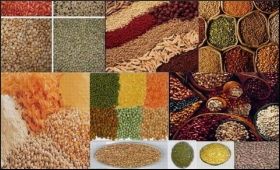|
|
|

|
Govt measures didn't fructify into drastic decline in pulses' retail prices
|
|

|
|
| Top Stories |
 |
|
|
|
SME Times News Bureau | 10 Jan, 2022
Retail prices of nutrient-rich pulses have not shown any drastic decline
in the past few months despite several interventions and measures
introduced by the Centre to cool off prices.
Prices of the
largest consumed pulses -- chana -- fell by just Re 1 to Rs 73 per kg in
the past three months in key markets of Delhi, data from Price
Monitoring Division of Department of Consumer Affairs showed. In Mumbai,
on the other hand, it rose by Rs 6 during the same period to Rs 89.
For tur, prices have fallen by Rs 8 to Rs 102 per kg in Delhi during the period. In Mumbai, it fell by Rs 13 to Rs 101.
Urad
prices have fallen by Rs 5 and Rs 14 per kg in Delhi and Mumbai,
respectively. On Friday, it was priced at Rs 118 and Rs 115 per kg in
the two key major consuming regions, respectively, the Price Monitoring
Division data showed.
Almost the same is the case for both moong and masur.
In
order to curb rising pulse prices apparently due to large hoarding, the
Centre in July 2021 imposed a stock limit on all pulses except moong
under the Essential Commodities Act as well as tightening its price
monitoring mechanisms.
For masur, it had reduced the basic import
duty to zero and Agriculture Infrastructure and Development Cess to 10
per cent from late July 2021.
Besides, the Centre has extended
the ease in quantitative import restrictions policy for pulses such as
tur, urad, and moong till March 2022. Earlier, only tur and urad were
under the 'free' category, which was supposed to be over by December 31.
Myanmar, Canada and Tanzania are few major suppliers of pulses to India.
Even
though India is a major producer of pulses, its domestic consumption
outstrips the production, which pushes the country to import such
commodities from other nations.
However, lately, the Centre has
shown strong interest in raising domestic output of pulses and also took
various initiatives as part of its self-sufficiency goal.
Furthermore,
in December, 2021, it had suspended trade in futures contracts of some
agricultural commodities for one year, including for that of chana.
According
to data, consumer price inflation (CPI) jumped to a three month high of
4.9 per cent in November, while inflation on pulses moderated to 3.18
per cent in November compared with 5.42 per cent in October 2021.
With
arrivals of rabi crops in the markets in next couple of months, any
sharp price rise is unlikely to take place from here, said market
participants.
As per the latest data available with Crops
Division of Department of Agriculture and Farmers Welfare, farmers have
sown pulses over 15.2 million hectares of land as of December 31, 2021,
as compared to 15.4 million hectares sowed during the same period
previous season.
|
|
|
| |
|
|
|
|
|
|
|
|
|
|
|
|
|
|
| |
| Customs Exchange Rates |
| Currency |
Import |
Export |
US Dollar
|
₹91.35
|
89.65 |
UK Pound
|
₹125.3
|
₹121.3 |
Euro
|
₹108.5
|
₹104.85 |
| Japanese
Yen |
₹58.65 |
₹56.8 |
| As on 19 Feb, 2026 |
|
|
| Daily Poll |
 |
 |
| What is your primary "Make or Break" expectation from the Finance Minister this year? |
|
|
|
|
|
| Commented Stories |
 |
|
|
|
|
|
| |
|